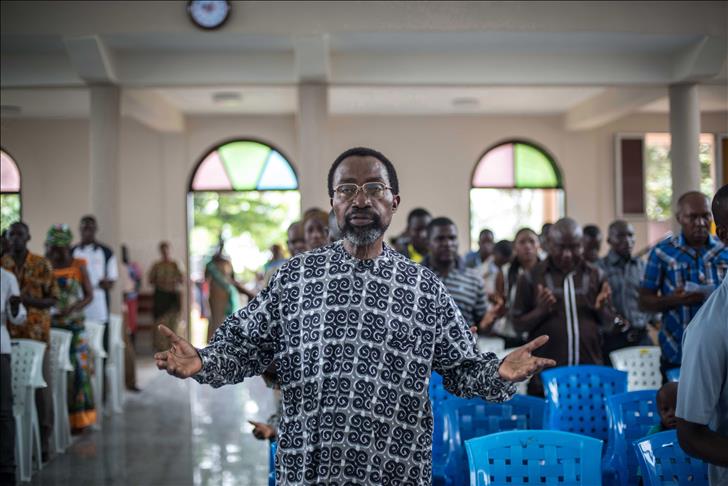
By Cinnatus Dumbuya
FREETOWN
Religious leaders in Sierra Leone have joined forces to help contain the spread of the deadly Ebola virus, using references from the Quran and the Bible to discourage the faithful from practices that could endanger their lives.
"Sierra Leoneans are prayerful: people believe in prayers and their religious leaders," Alhaji Bailor Jalloh, CEO of FOCUS 1000, a local NGO, told Anadolu Agency.
"We're not saying that people shouldn't pray; they should, because prayer gives hope," he said.
"But in addition to prayer, people should take the right action, and religious leaders can help their followers take the necessary actions in order to stay safe from Ebola," insisted Jalloh.
Religion is central to the lives of many Sierra Leoneans.
It is considered the driving force behind everything – from the family structure to relationships within and among different social groups.
With that in mind, Jalloh's NGO has mobilized Muslim and Christian religious leaders to help break the chain of Ebola transmission.
He said religious leaders had been trained to use scriptural references to discourage the faithful from practices that could put their lives at risk.
"We've developed material that contains key messages that are supported by both the Quran and the Bible: messages like, don't wash dead bodies, report illness to hospitals, and wash your hands with soap and water regularly," he told AA.
Health officials have pointed to some traditional and religious practices that they say have been counterproductive in their efforts to end the Ebola menace in Sierra Leone.
Some of these practices include funeral rites that involve touching and washing – and sometimes kissing – the bodies of departed loved ones.
Recent statistics released by the Sierra Leone Health Ministry suggest that between 70 and 80 percent of infected people contracted the virus due to the unsafe handling and burial of deceased relatives.
Many people secretly bury dead bodies without reporting it to the authorities for fear their relatives would be buried in a disrespectful manner.
Many people believe their relatives would just be dumped in a massive grave by a burial team.
Jalloh recalled that, in one incident, villagers in the northern part of the country exhumed the remains of their village imam, who had been buried by a government burial team.
Protesting the manner in which their imam had been buried, they exhumed the body and washed it before reburying it again.
Jalloh said some villagers had even bathed themselves with the wash water, thinking it would be a blessing.
According to him, this led to so many deaths that the entire village was almost wiped out.
-Adapting-
Jalloh said his organization had resorted to the prominent Sierra Leone Inter-Religious Council, a group comprising Muslim and Christian leaders, to staunch the steadily rising number of Ebola infections.
Council President Sheikh Abu Bakarr Conteh says many people are maintaining traditional practices because of their beliefs.
"People believe if they don't wash the dead body, the person will not go to heaven," he told AA.
"This is a serious concern to us. That's why, as religious leaders, we want to intensify our campaign to contain the virus," said the Muslim scholar.
"These are abnormal times; people should be willing to change behavior that puts them at risk of contracting the virus," he insisted.
These sentiments were echoed by Rev. Christian Sotin Koroma, who heads the inter-religious council's Christian action group.
She encourages members of her congregation to listen to their pastors and follow the advice of health officials.
"Prayer can do a lot, depending on the level of faith people have," she told AA.
"But… prayer goes with action. When you pray, you also act, which means using our common sense and refraining from behavior that puts us at risk," said Koroma.
"In these circumstances, we've got to listen to what the officials are saying," the Christian clergywoman insisted.
It is not the first time religious leaders have been recruited to participate in a national campaign in Sierra Leone.
They were enlisted in 1986 to help convince families to allow their children to be vaccinated against childhood diseases.
With the help of religious leaders, immunization rates in the country jumped from 4 percent in 1986 to over 75 percent in 1990.
Abdulai Conteh, a Muslim who resides in Freetown, feels the involvement of his imam will help raise awareness about Ebola in more communities and eventually help change attitudes and behavior.
He also applauded the Health Ministry which has instituted a system of safe medical burials in which the deceased and their families are treated in a dignified manner.
"I am happy that the government has adopted a new burial policy," Conteh told AA.
People can now invite their imams to pray for their departed relatives – from a safe distance – before the latter is taken away for burial.
In the case of Christians, meanwhile, family members can provide coffins in which to put their deceased loved ones.
"People should find some solace in this," Conteh believes.
englishnews@aa.com.tr
Anadolu Agency website contains only a portion of the news stories offered to subscribers in the AA News Broadcasting System (HAS), and in summarized form. Please contact us for subscription options.


